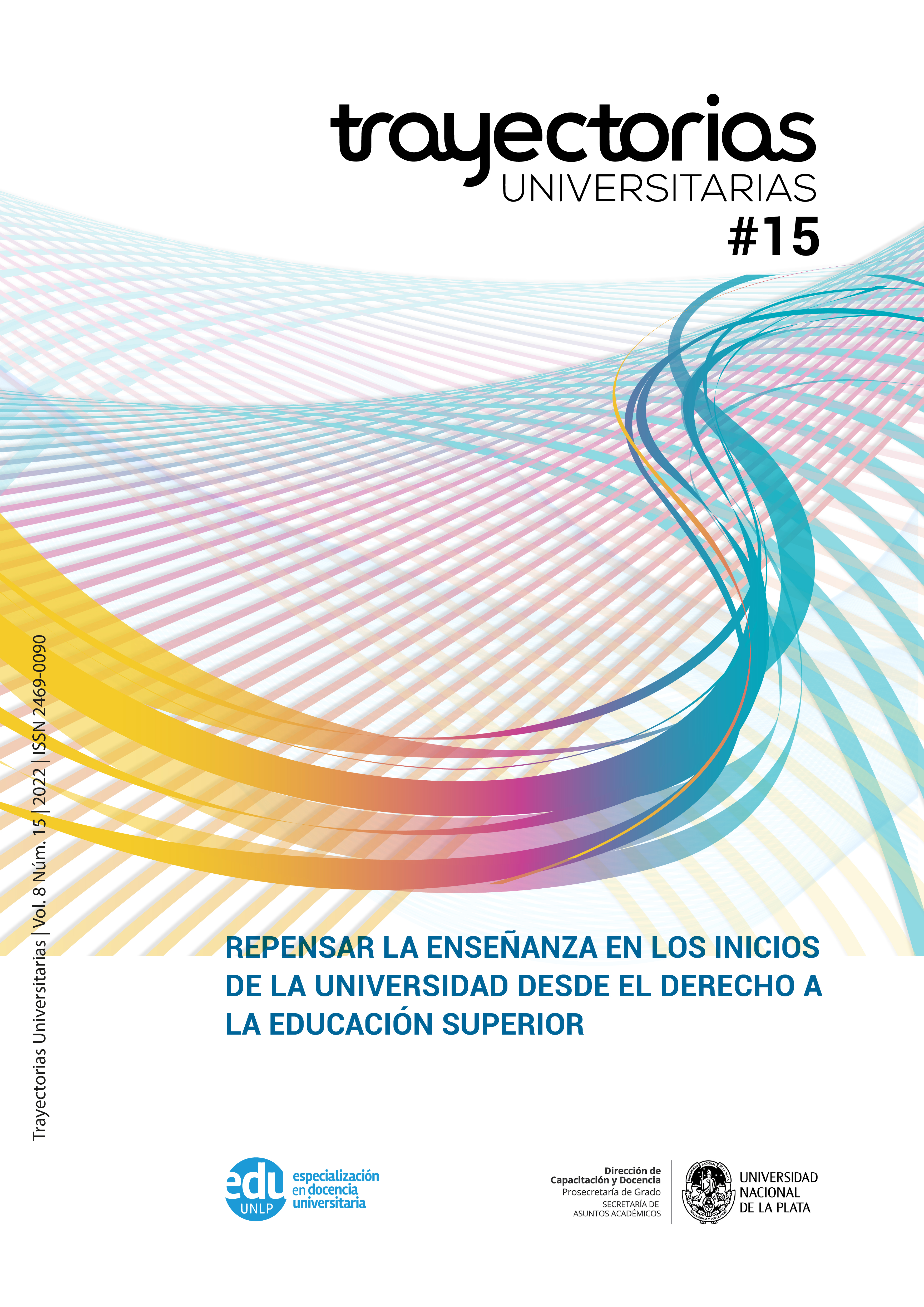Hybrid classroom: A window to the possible path
DOI:
https://doi.org/10.24215/24690090e108Keywords:
new normality, self-managed learning, upper levelAbstract
As of 2022 in our country, it returns to normality, but this is not exactly the same as that of the pre-pandemic, establishing "a new normality". Education must adapt to the new circumstances and the role of the teacher accompanies these changes, becoming a mediator, favoring self-managed training processes. It is important that the pedagogical offer is in accordance with the needs, therefore, the purpose of this work is to share a specific experience of a hybrid model in the Faculty of Natural Sciences and Museum of the UNLP. To find out how the hybrid model was received, a survey was carried out among the students, which allowed us to find out if this mixed model was chosen as the first option, if they are satisfied with the face-to-face meetings prior to each partial, and the advantages and disadvantages they find in this type of course Responses from 34% of the students were received. 45% of them were written down by their own choice and 90% are satisfied with the methodology. In our experience, it was possible to supplement the inconveniences regarding the recognition of practical material, by incorporating the hybrid model, adding face-to-face classes that enriched the pedagogical proposal through practical classes, consultation, exchange, and debate.
Downloads
Metrics
References
Alfaro Sánchez, D., García-Ceca J., Hernández, L. y Gutiérrez Cañas, I. (2014). Virtualización y ampliación del material docente para las prácticas de laboratorio de la asignatura de Biología Celular e Histología. Proyecto de Innovación Docente. https://eprints.ucm.es/id/eprint/29323/
Andino, P. A., Santos, O. M. B., Suarez, A. E. G., Burgos, G. H. P., & Mendieta, G. N. (2022). Educación virtual vs educación presencial ventajas y desventajas para los estudiantes en universidades públicas: Caso UG. Polo del Conocimiento, 7 (7), 843-860.
Córdoba-Díaz, D., Fraguas-Sánchez, A. I., Córdoba-Díaz, M., Aparicio-Blanco J., Fernandez-Carballido, A., Negro-Álvarez, S., Barcia-Hernández, E., García De Fernando Minguillón, G., Torres-Suárez, A. I. y Martín-Sabroso C. (2021). Recursos para la virtualización de prácticas de laboratorio de materias de carácter tecnológico: aplicación y validación de los mismos en tecnología farmacéutica. Revista Iberoamericana de Tecnología en Educación y Educación en Tecnología, vol. 28, pp. 17-23.
Giorda Ugarteche, M. E., Fernando Soria, F. y Viggiani, A. (2022). La Bimodalidad en el Nivel Superior. En la mira. La educación superior en debate Vol. 3 Núm. 4
Gómez Reyes, L. (2017). B-learning: ventajas y desventajas en la educación superior. In VII Congreso Virtual Iberoamericano de Calidad en Educación Virtual ya Distancia. México. http://www.eduqa.net/eduqa2017/
Gracia, M. (2020). Aulas híbridas: tecnología y educación en un mundo pandémico. El Periódico. https://www.elperiodico.com/es/activos/innovadores/20200902/aulas-hibridas-wacom-vuelta-cole-educacion-pandemia-8095324
Hernández, Y., López, L. y López, E. (2020). Terminología y escritura en tiempos de COVID-19. CorSalud, 12(2), 184-188. http://scielo.sld.cu/scielo.php?script=sci_arttext&pid=S2078-71702020000200184%20&lng=es&tlng=es
Luna, A., & Steiman, B. (2020). La educación bimodal como puerta de acceso a la Universidad. In III Jornadas sobre las Prácticas Docentes en la Universidad Pública (Edición en línea, junio de 2020).
Miranda Izquierdo, J. y Mainegra Fernández, D. (2006). Aprender a aprender: el aprendizaje autogestionado. Mendive. Revista de Educación, 4(4), 283-289. https://mendive.upr.edu.cu/index.php/MendiveUPR/article/view/246
Ordorika, I. (2020). Pandemia y educación superior. Revista de la Educación Superior, 49(194), 1-8.
Oviedo, P. E. (2013). El aprendizaje autogestionado y colaborativo. Revista de la Universidad de La Salle, (60), 277-288.
Valdivia-Vizarreta, P. y Noguera, I. (2022). La docencia en pandemia, estrategias y adaptaciones en la educación superior: Una aproximación a las pedagogías flexibles. Edutec. Revista Electrónica De Tecnología Educativa, (79), 114-133.
Downloads
Published
How to Cite
Issue
Section
License
Copyright (c) 2022 Andrea Armendano, Sandra González, Nora Camino

This work is licensed under a Creative Commons Attribution-NonCommercial-ShareAlike 4.0 International License.
La aceptación de un original por parte de la revista implica la cesión no exclusiva de los derechos patrimoniales de los/as autores/as en favor del editor, quien permite la reutilización, luego de su edición (postprint), bajo una Licencia Creative Commons Atribución-NoComercial-CompartirIgual 4.0 Internacional (CC BY-NC-SA 4.0).
Acorde a estos términos, el material se puede compartir (copiar y redistribuir en cualquier medio o formato) y adaptar (remezclar, transformar y crear a partir del material otra obra), siempre que a) se cite la autoría y la fuente original de su publicación (revista y URL de la obra), b) no se use para fines comerciales y c) se mantengan los mismos términos de la licencia.
La cesión de derechos no exclusivos implica que luego de su edición (postprint) en Trayectorias Universitarias los/as autores/as pueden publicar su trabajo en cualquier idioma, medio y formato; en tales casos, se solicita que se consigne que el material fue publicado originalmente en esta revista.
Tal cesión supone, también, la autorización de los/as autores/as para que el trabajo sea cosechado por SEDICI, el repositorio institucional de la Universidad Nacional de La Plata, y sea difundido en las bases de datos que el equipo editorial considere adecuadas para incrementar la visibilidad de la publicación y de sus autores/as.
Asimismo, la revista incentiva a los/as autores/as para que luego de su publicación en Trayectorias Universitarias depositen sus producciones en otros repositorios institucionales y temáticos, bajo el principio de que ofrecer a la sociedad la producción científica y académica sin restricciones contribuye a un mayor intercambio del conocimiento global.















